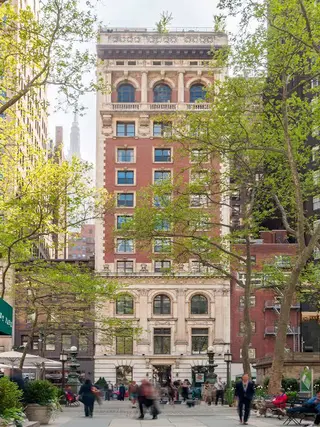 Carter Horsley
Carter HorsleyDec 23, 2011
Carter's Review
This extremely handsome building on the south side of Bryant Park at 32 West 40th Street was erected in 1905 as the Engineers' Club and was designed by Whitefield & King.
One of the firm's partners, Henry D Whitfield was the brother of Andrew Carnegie's wife, Louise. Mr. Carnegie paid for half of the building's construction cost and Mr. Whitfield's firm had designed a garage for the Carnegies in 1904.
According to a "Streetscapes" column in The New York Times August 13, 1995 by Christopher Gray, Whitfield & King had beat out Carrere & Hastings and Clinton & Russell among other firms for the design of the club.
The Engineers Club had previously occupied a house at 374 Fifth Avenue near 35th Street and decided to join other clubs then building on 40th Street between Fifth and Sixth Avenues: the New York Club at 20 West 40th Street and the Republican Club at 54 West 40th Street.
At that time, Mr. Carnegie offered $1.5 million for a joint professional engineers center and, according to Mr. Gray, the American Society of Mechanical Engineers, the American Institute of Electrical Engineers and the American Institute of Mining Engineers bought the property at 25 West 39th Street behind the Engineers Club and commissioned Hale & Rogers to design a Roman-style building.
In 1979, Mr. Gray wrote, "the engineers left 40th Street for rented quarters, selling to a developer, David Eshagin. He gave his architect, Seymour Churgin, the difficult task of dividing up the large clubrooms into apartment-sized units. Whether for economy or for style, they left the giant open marble stair hall running from the first to the third floors and left several of the large central spaces as giant hallways."
The main club room and the library on the second floor were divided into four apartments.
The building was converted to a co-op in 1983 and renamed The Columns and was again renamed to Bryant Park Place.
It has 82 apartments.
In the 1990s, Midtown Preservation of Oyster Bay, L.I. began a replacement of the marble on the fourth and 11th floors with fiberglass replicas, according to Mr. Gray.
The building is an official city landmark.
It has a large bronze plaque that a proclaims that the Engineers Club’s “renowned membership included Andrew Carnegie, President Herbert Hoover, Thomas Edison, Brig. Gen. Charles Lindbergh, Cornelius Vanderbilt, Henry Clay Frick, H. H. Westinghouse and Nikola Tesla.” “The club,” it continued, “was Carnegie’s tribute to ordinary men doing extraordinary things.”
“The Engineers Club was one of the first ‘skyscrapers’ in midtown. The adjoining brownstones to the east and west were purchased by the club in 1923 and 1920 respectively,” it continued.
Bottom Line
Directly across from the Bryant Park Café at the rear of the New York Public Library two-block-long landmark building, this is a magnificent mid-block, mid-rise building with a very impressive grand staircase in its large lobby.
Description
The building is one of the most attractive of those around Bryant Park.
Mr. Gray noted that features of the façade of the Engineers Club "are the giant Corinthian pilasters at the second and third floors and the giant columns at the top," adding that "inside, the club had the usual assortment of rooms, including 66 bedrooms and a 300-seat dining room that covered the entire 11th floor. These attractions nearly doubled the membership, to 1,898…[and] Mark Twain spoke at the dedication in December 1907."
It has a rusticated one-story base beneath a two-story stone face under an elaborate and impressive decorative bandcourse that supports four vases. Above the bandcourse the building's shaft is red-brick with jagged stone quoins. The first, third and 11th floors have arched windows and the building has a nice cornice and stone window surrounds.
The building has multi-paned fenestration and some protruding air-conditioners.
The fifth edition of “The A. I. A. Guide to New York City Architecture” by Norval Whitel, Elliot Willensky and Fran Leadon remarked about this “Brick and limestone Georgian and
Renaissance Revival” building that “Giant Corinthian pilasters give this a scale appropriate to the New York Public Library opposite.”
Amenities
The building has a 24-hour doorman, fireplaces, a live-in superintendent, a bicycle room, high ceilings and retail spaces.
Apartments
Apartment 1A contains over half the taproom/grill space that originally extended across the full back lobby and has 14-foot-high ceilings and a skylit window and a decorative fireplace.
A one-bedroom penthouse unit in the rear of the building with a 19-foot-long living room and an enclosed 9-foot-wide kitchen was the subject of an April 16, 2015 article by Hana R. Alberts at ny.curbed.com entitled “No One Wants to Buy a Gaudy Mini ‘Versailles’ in Manhattan.” The article included several photographs of the apartment’s impressive and very ornate trompe l’oeil murals depicting Versailles-like interior grandeur, but also noted that the 750-square-foot apartment had been “on and off the market since 2006,” adding “that’s almost a decade of broker switches and price chops, with the most recent listing asking $775,000….Hand-painted murals on every available surface, gold filigree, and chandeliers dripping with sparkly crystal – even in the bathroom.”
Apartment 3D is a two-bedroom duplex unit with a 12-foot-wide entry foyer that leads to a 21-foot-long living room and a 17-foot-long, windowed kitchen and a bedroom on the lower level and a 14-foot-long hall, an 18-foot-wide media room and a second bedroom on the upper floor.
Apartment 3A is a one-bedroom duplex unit with a 6-foot-long entry foyer that leads to a 20-foot-long living room and 15-foot-wide, windowed, open kitchen and a spiral staircase on the lower level and a bedroom on the upper the level.
Apartment 9B is a studio nit with a 21-foot-wide living room and open kitchen.
Apartment 2K is a one-bedroom unit with a 17-foot-square living/dining room with a 12-foot-wide patio and a 12-foot-long dining room and an open 12-foot-long kitchen.

- Co-op built in 1907
- Converted in 1983
- 1 apartment currently for rent ($0)
- Located in Midtown West
- 82 total apartments 82 total apartments
- 10 recent sales ($439K to $885K)
- Doorman
- Pets Allowed
 6sqft delivers the latest on real estate, architecture, and design, straight from New York City.
6sqft delivers the latest on real estate, architecture, and design, straight from New York City.
